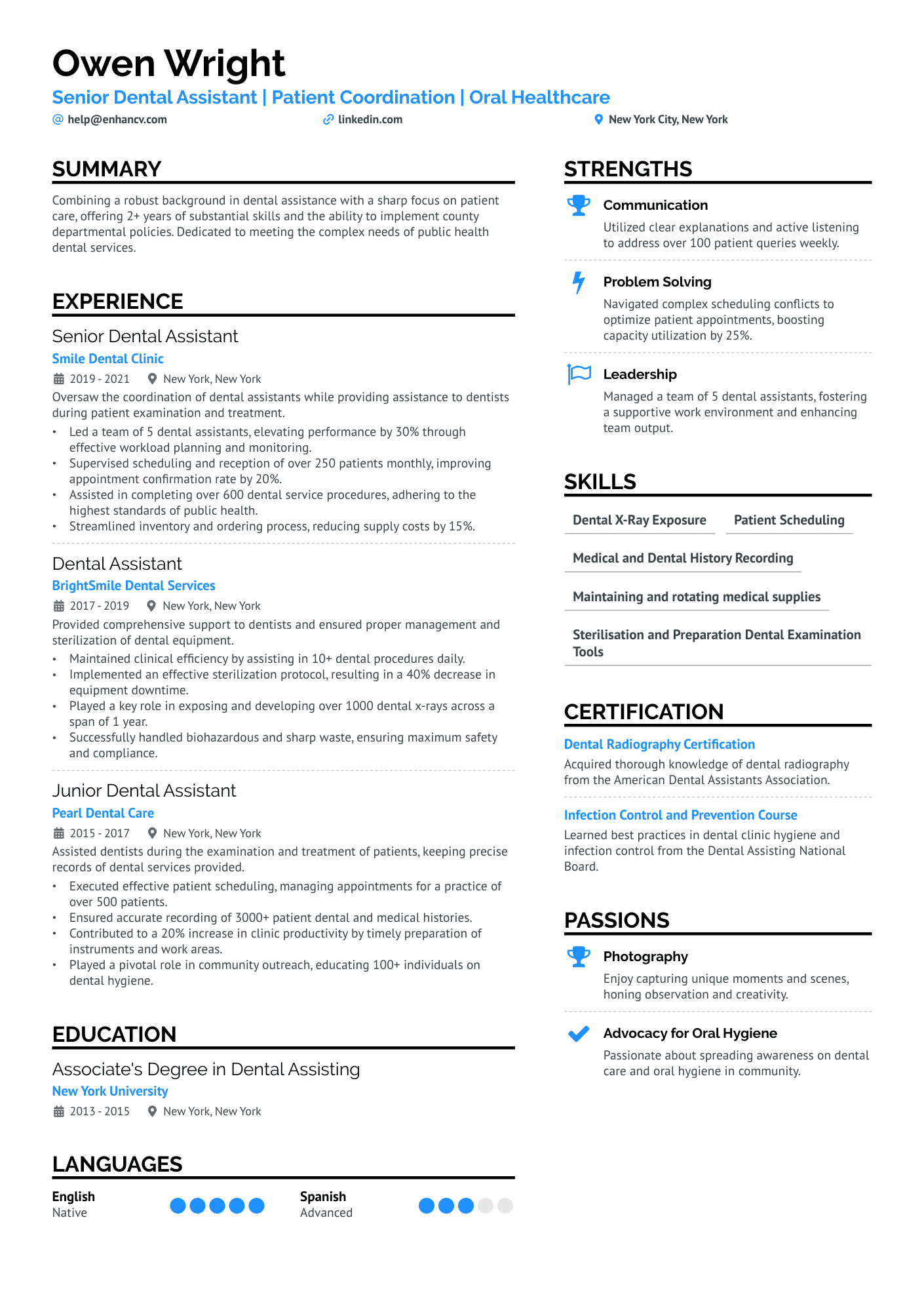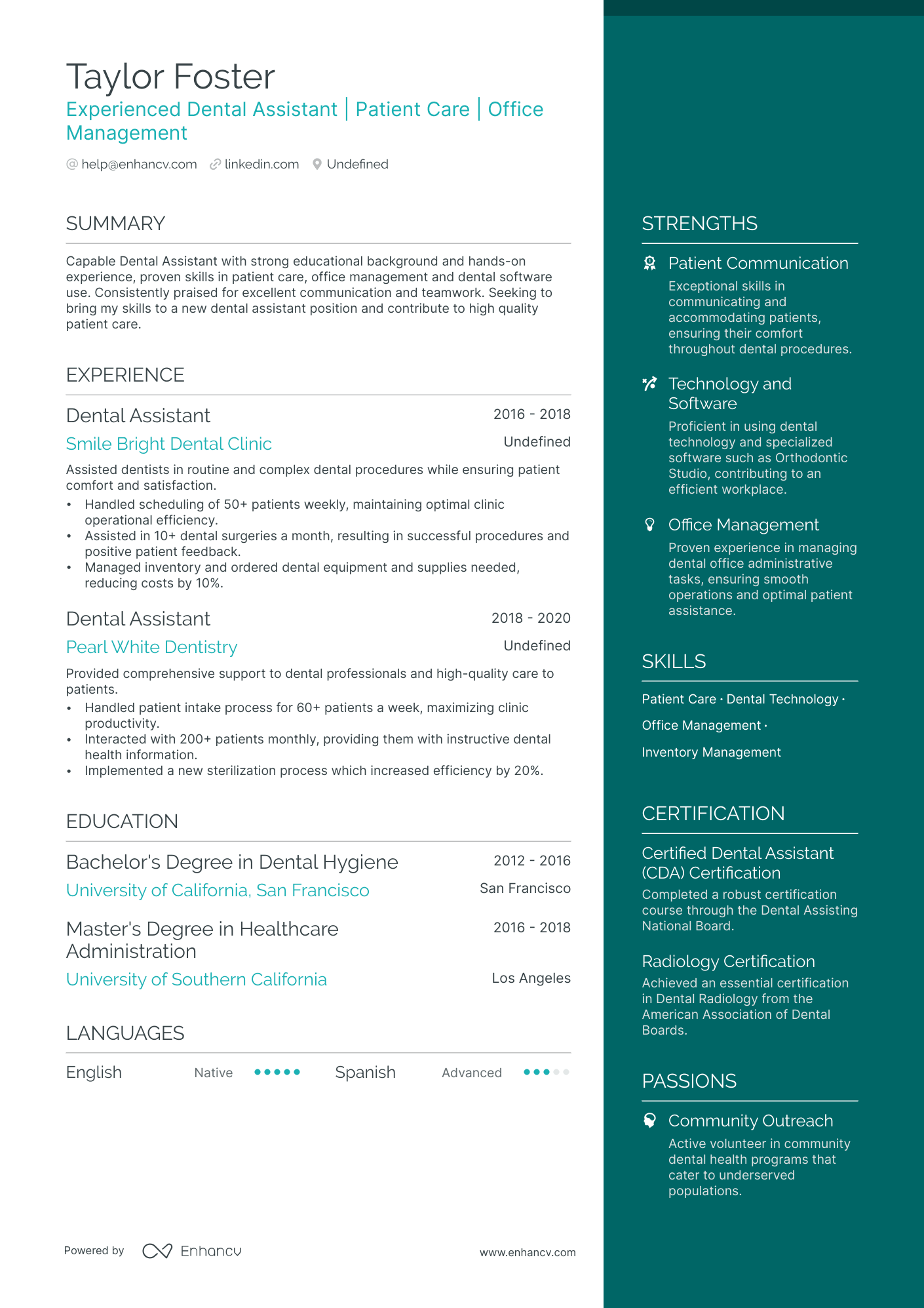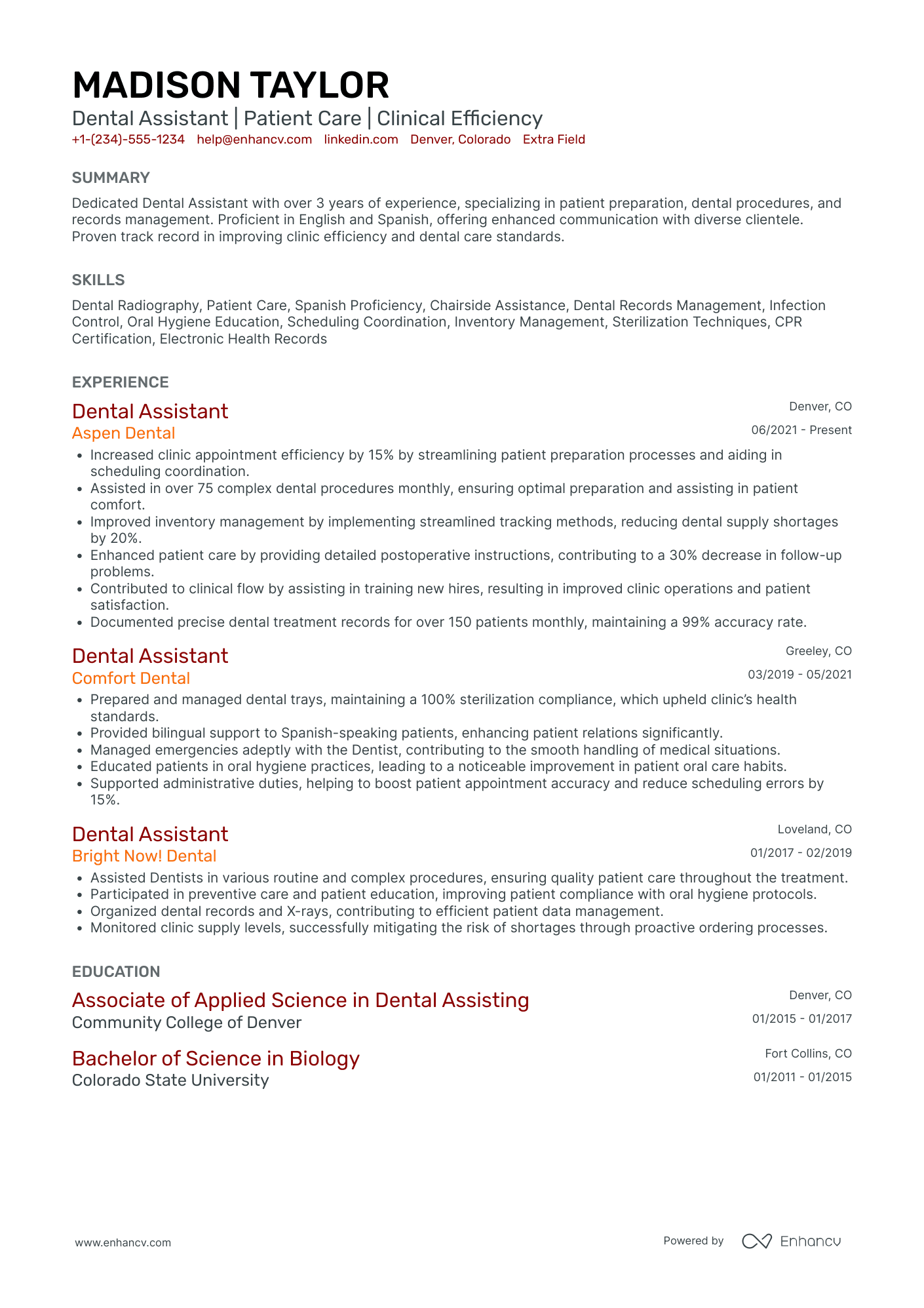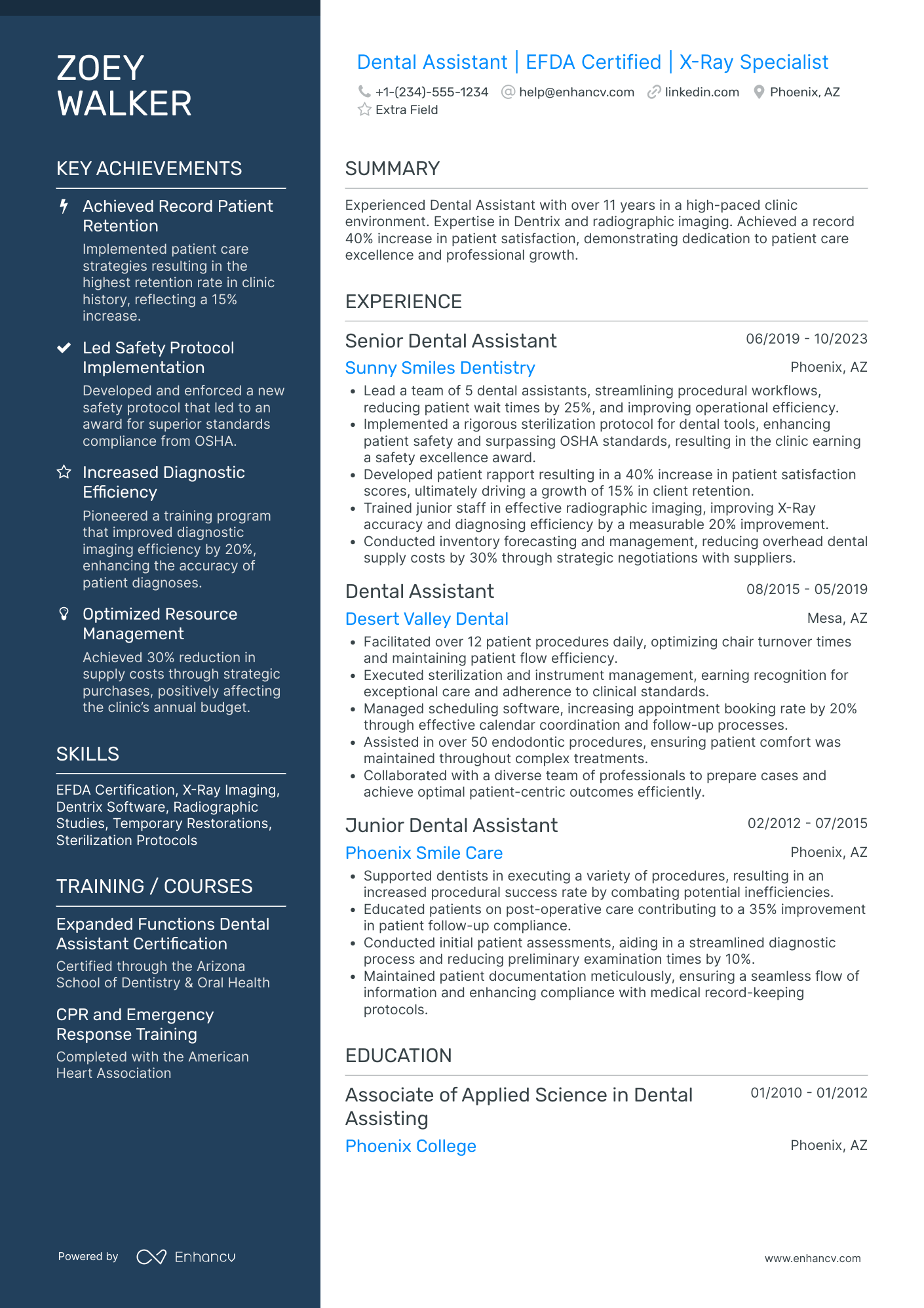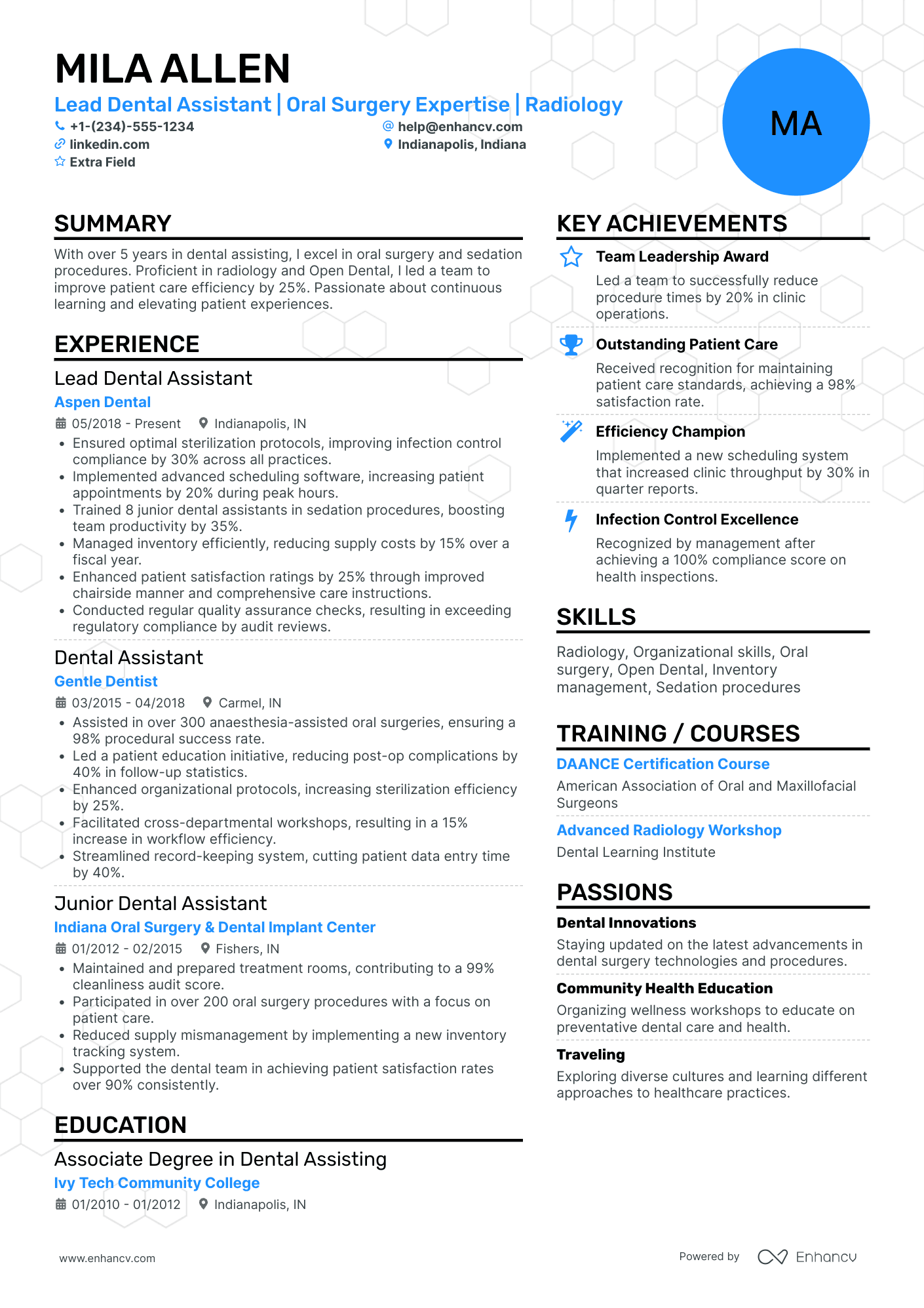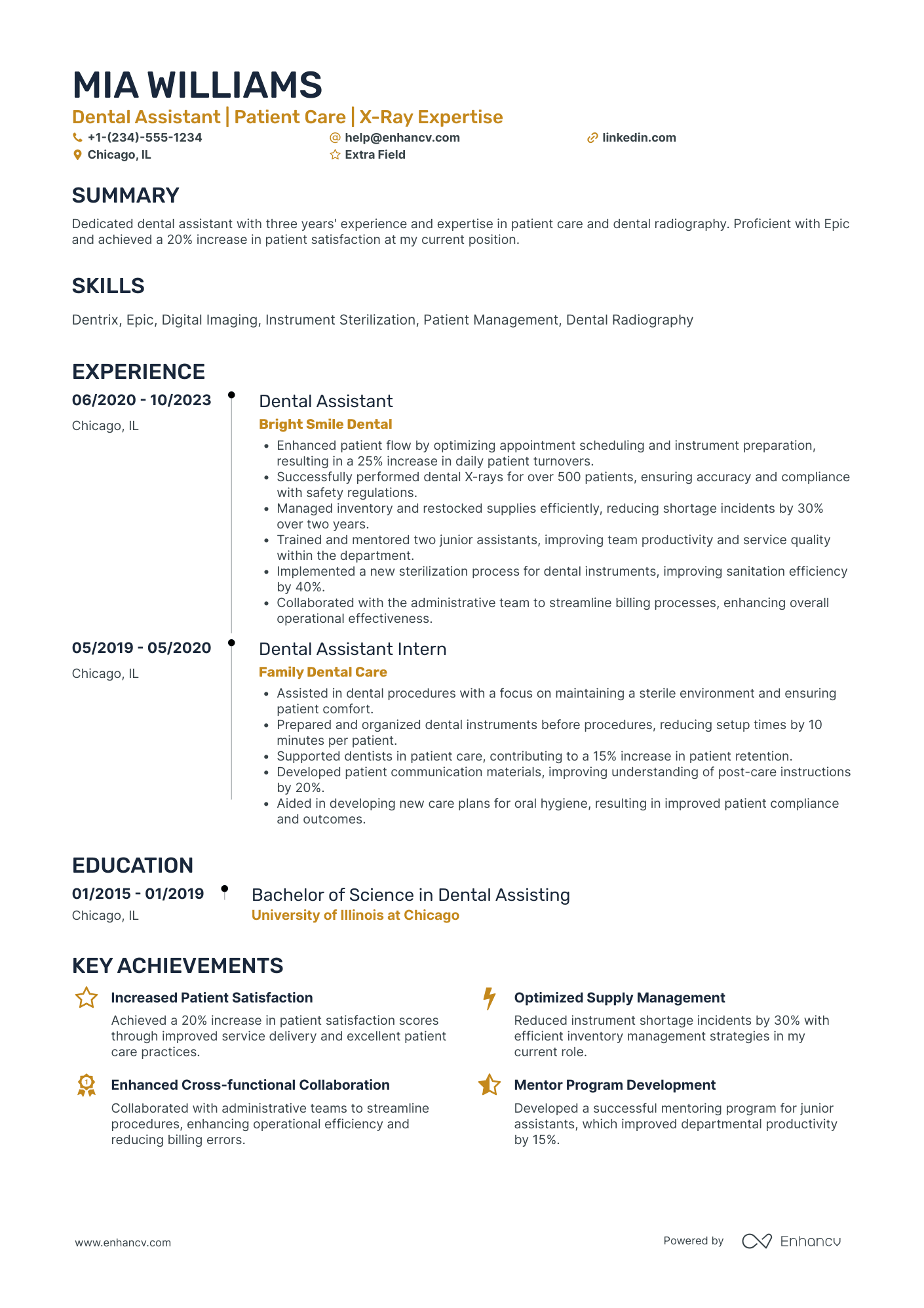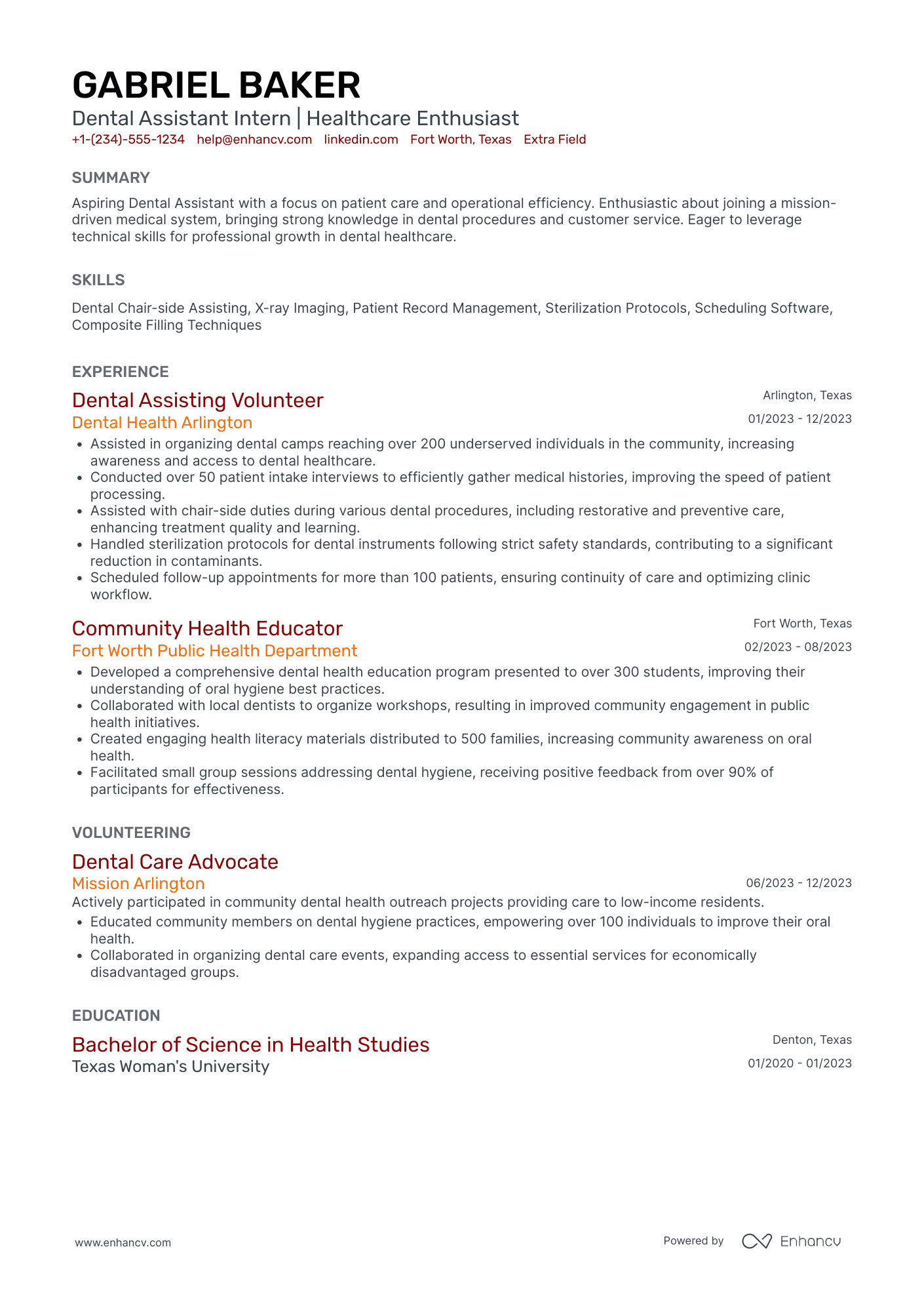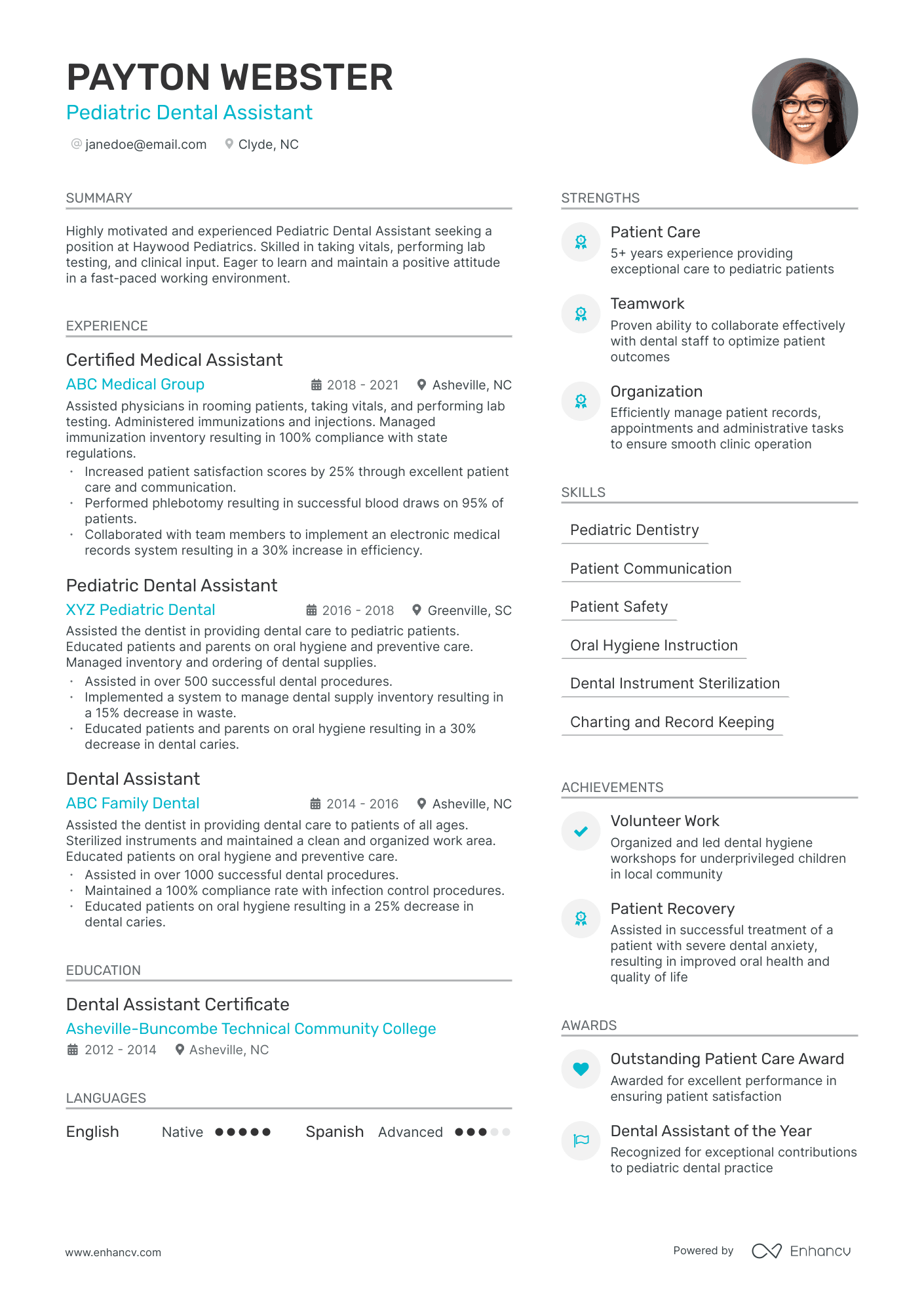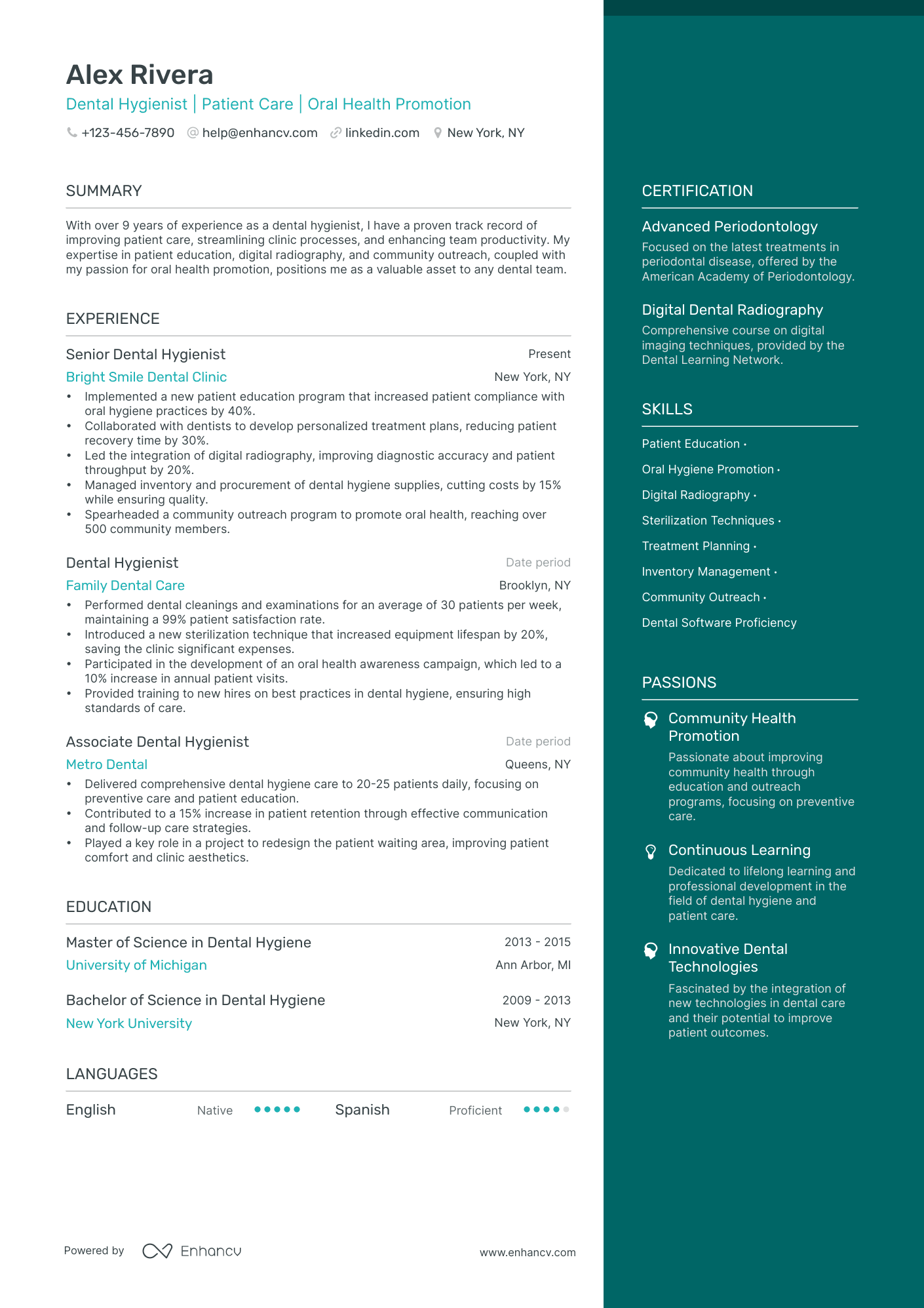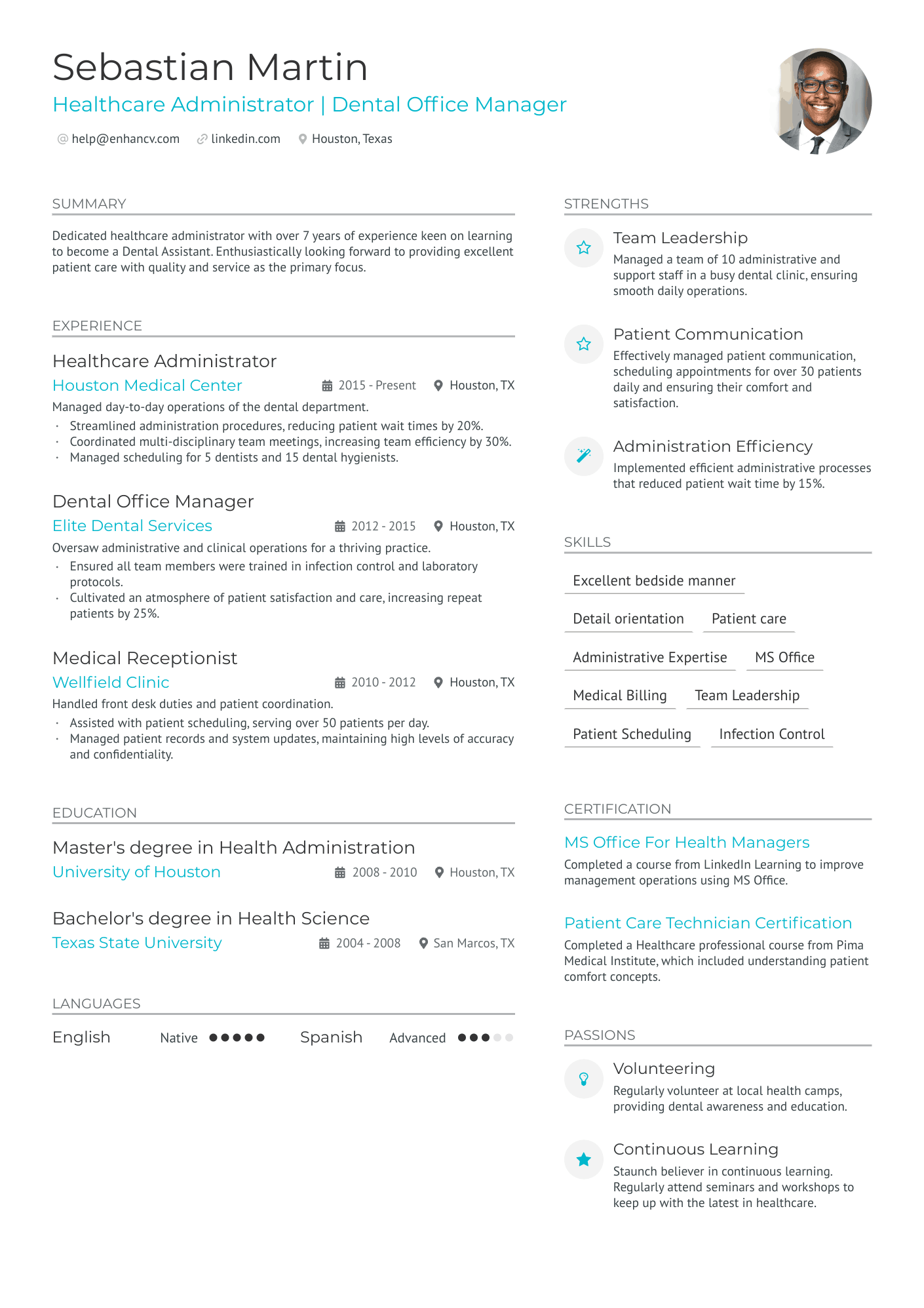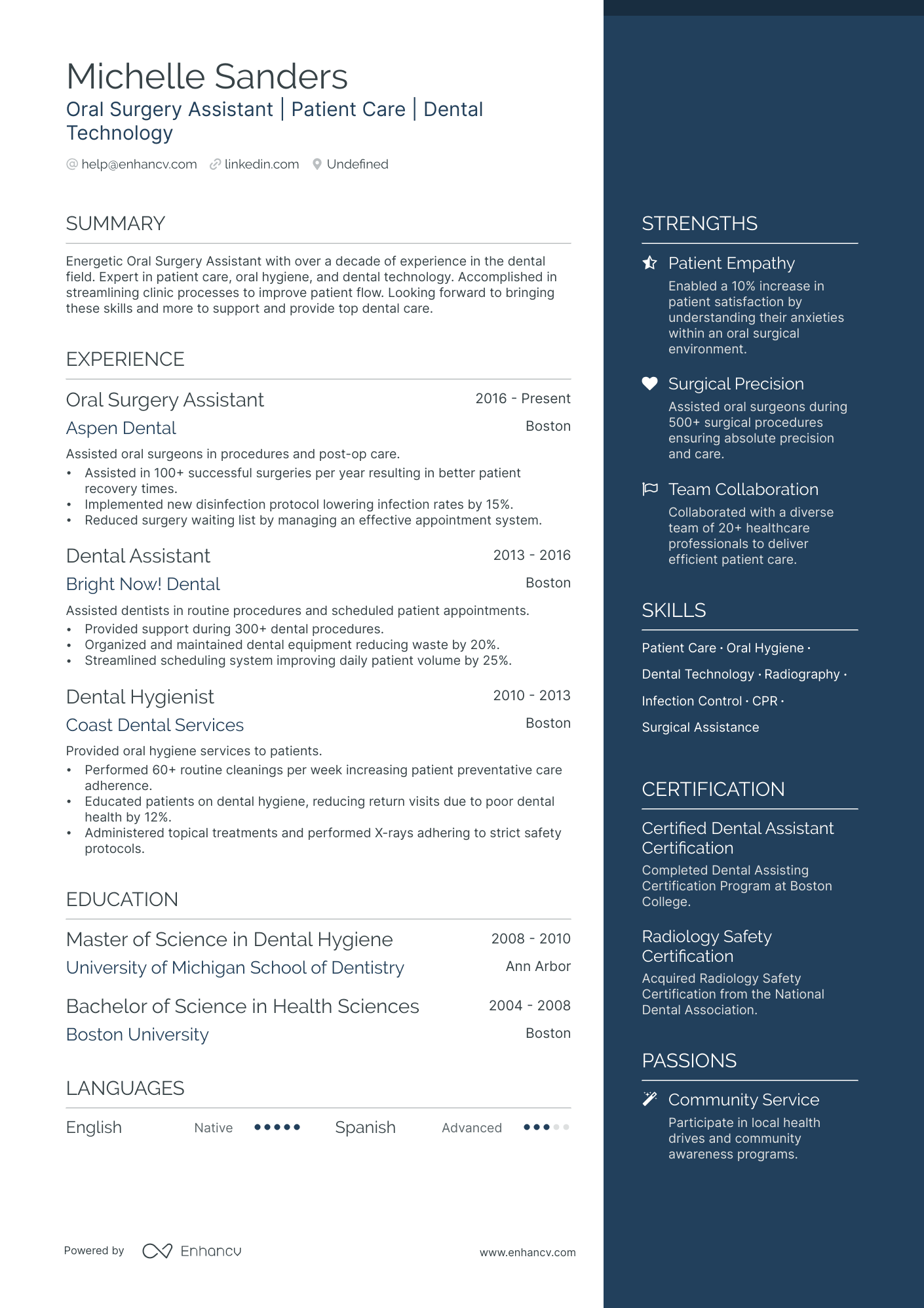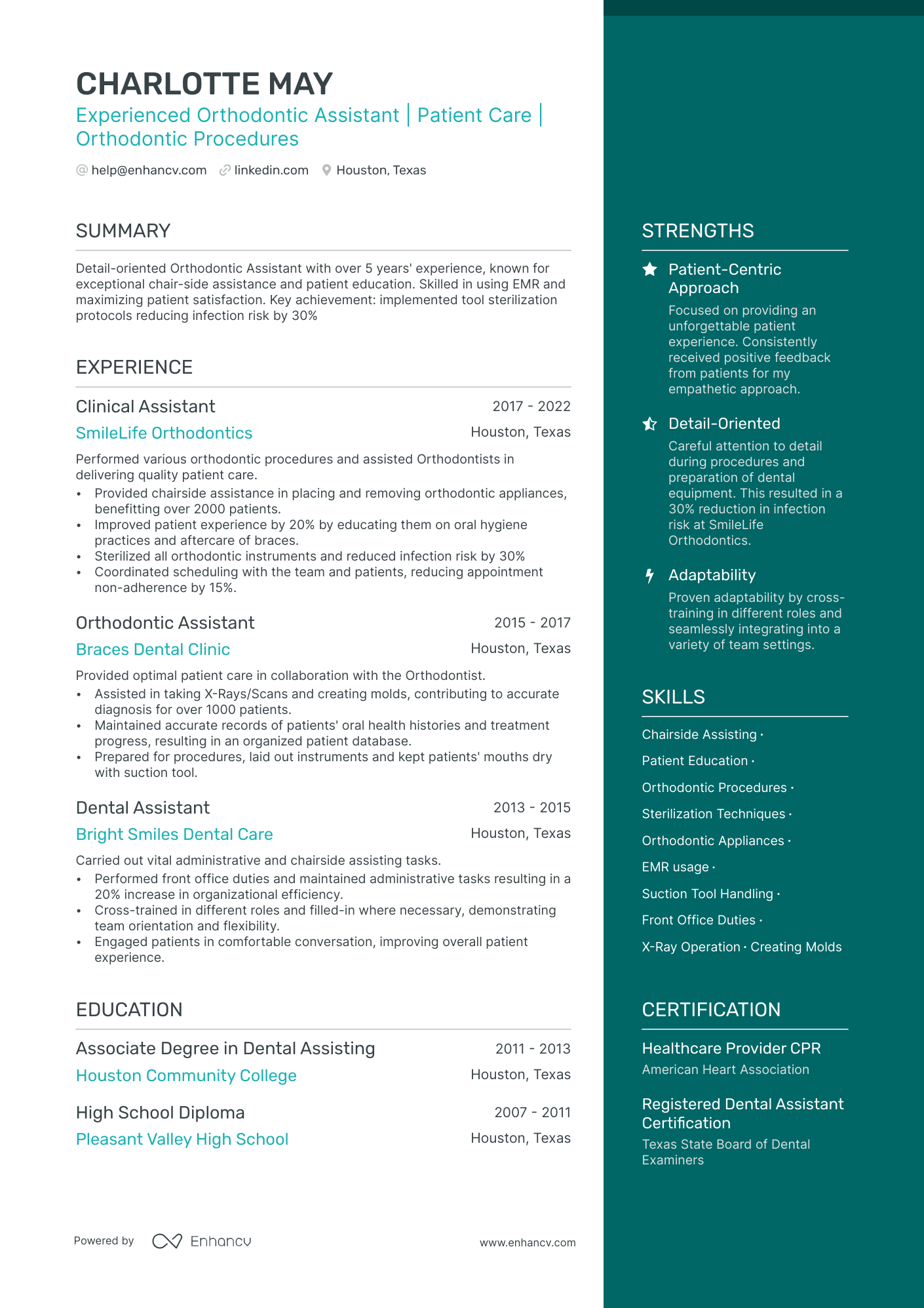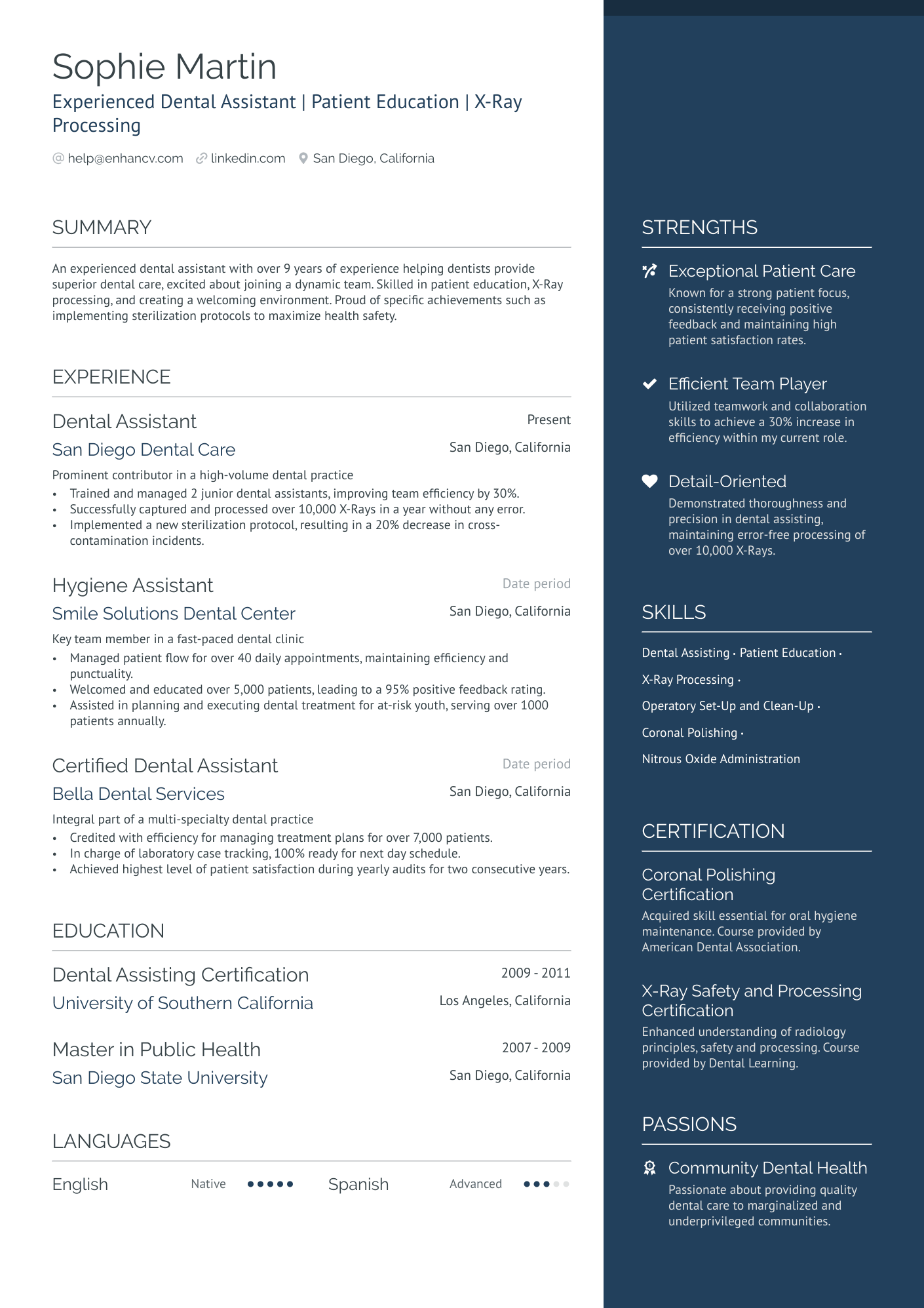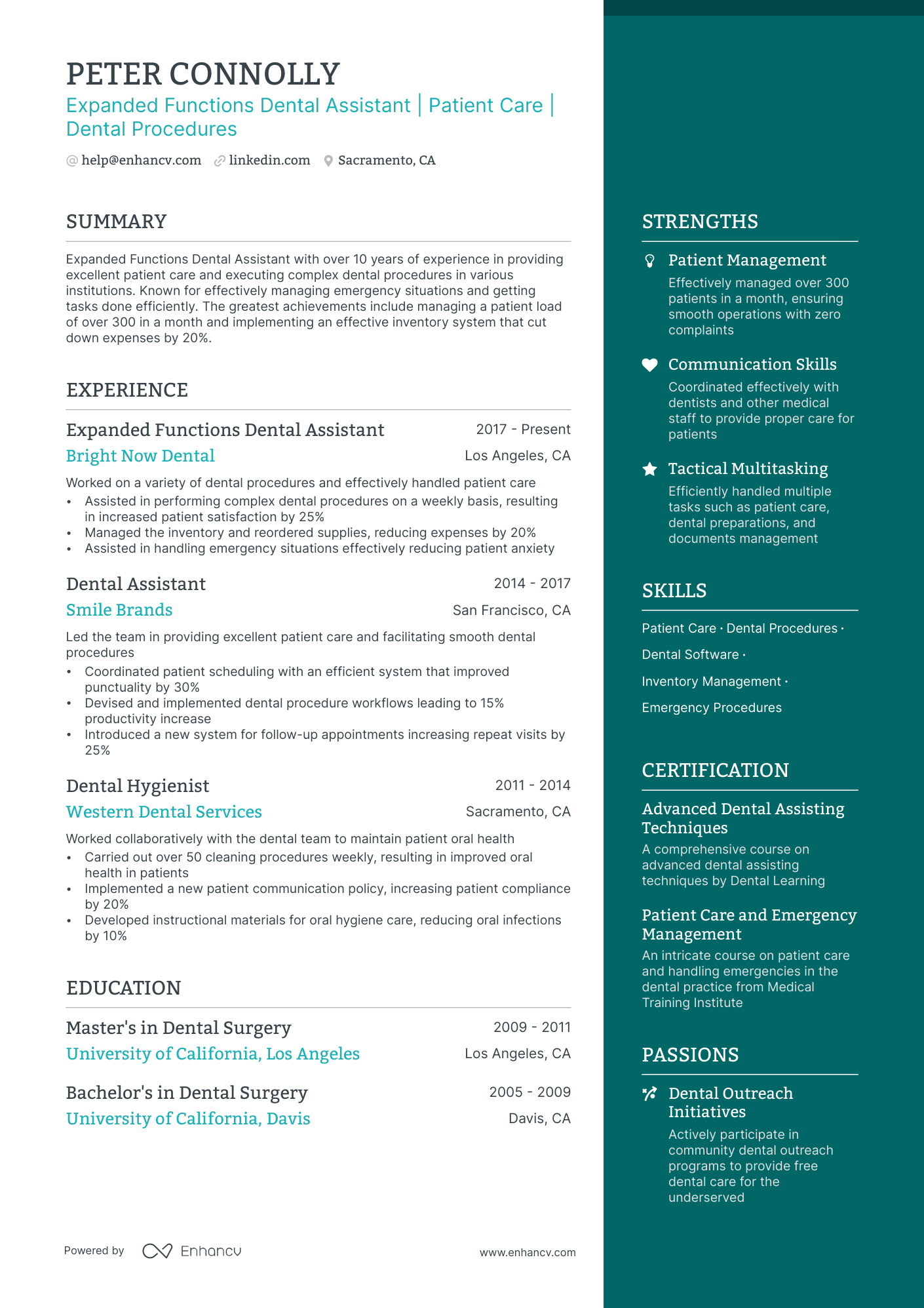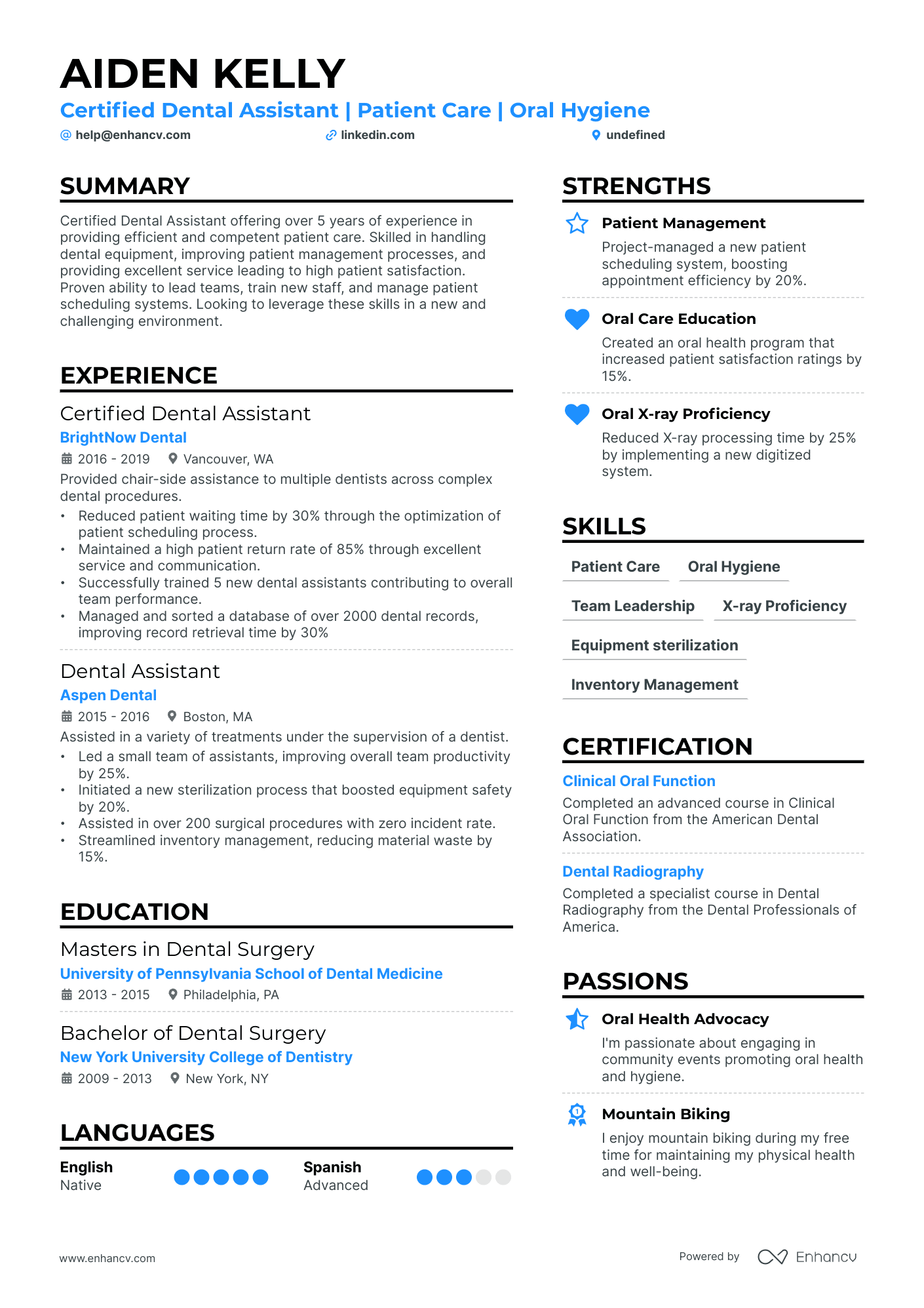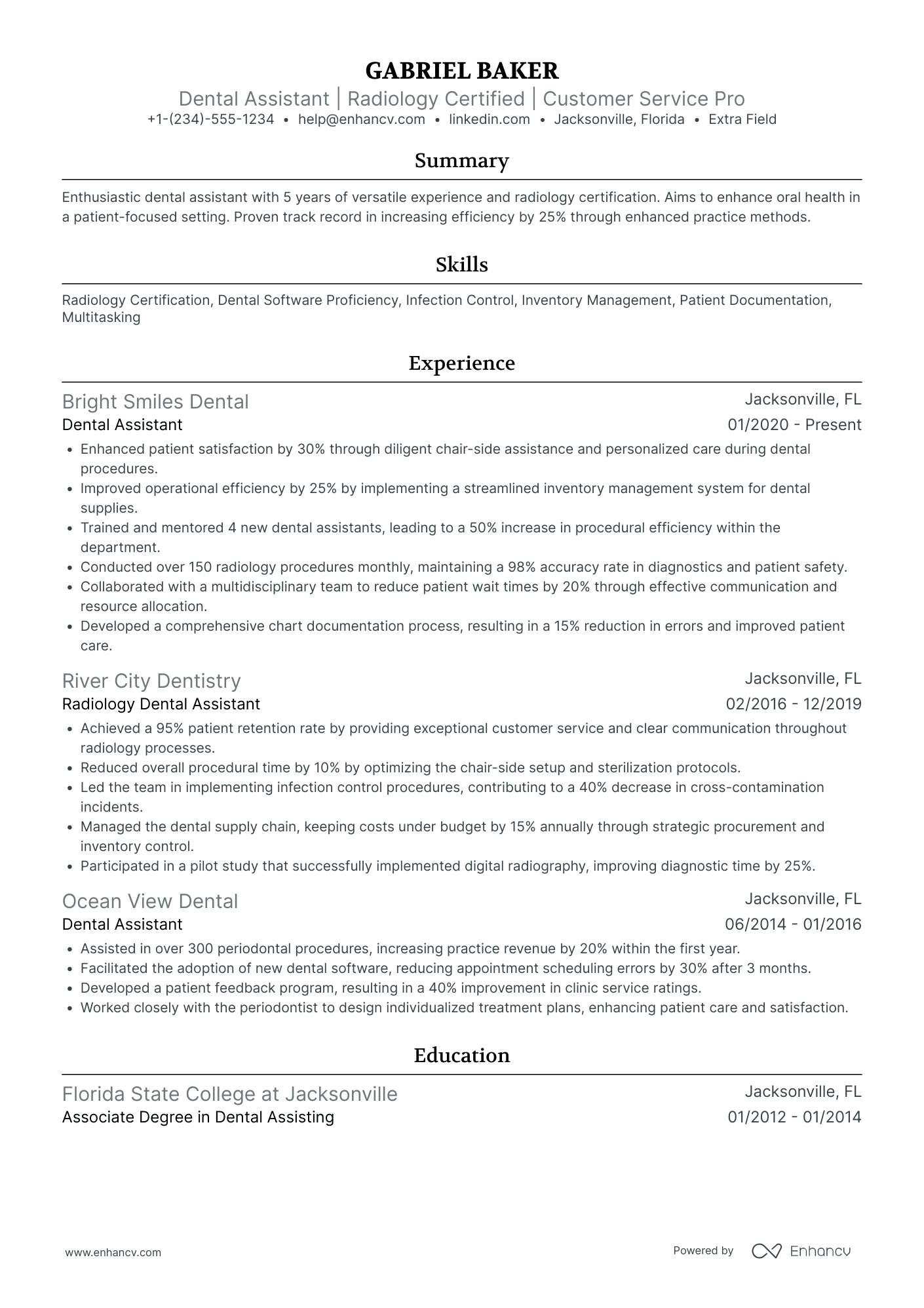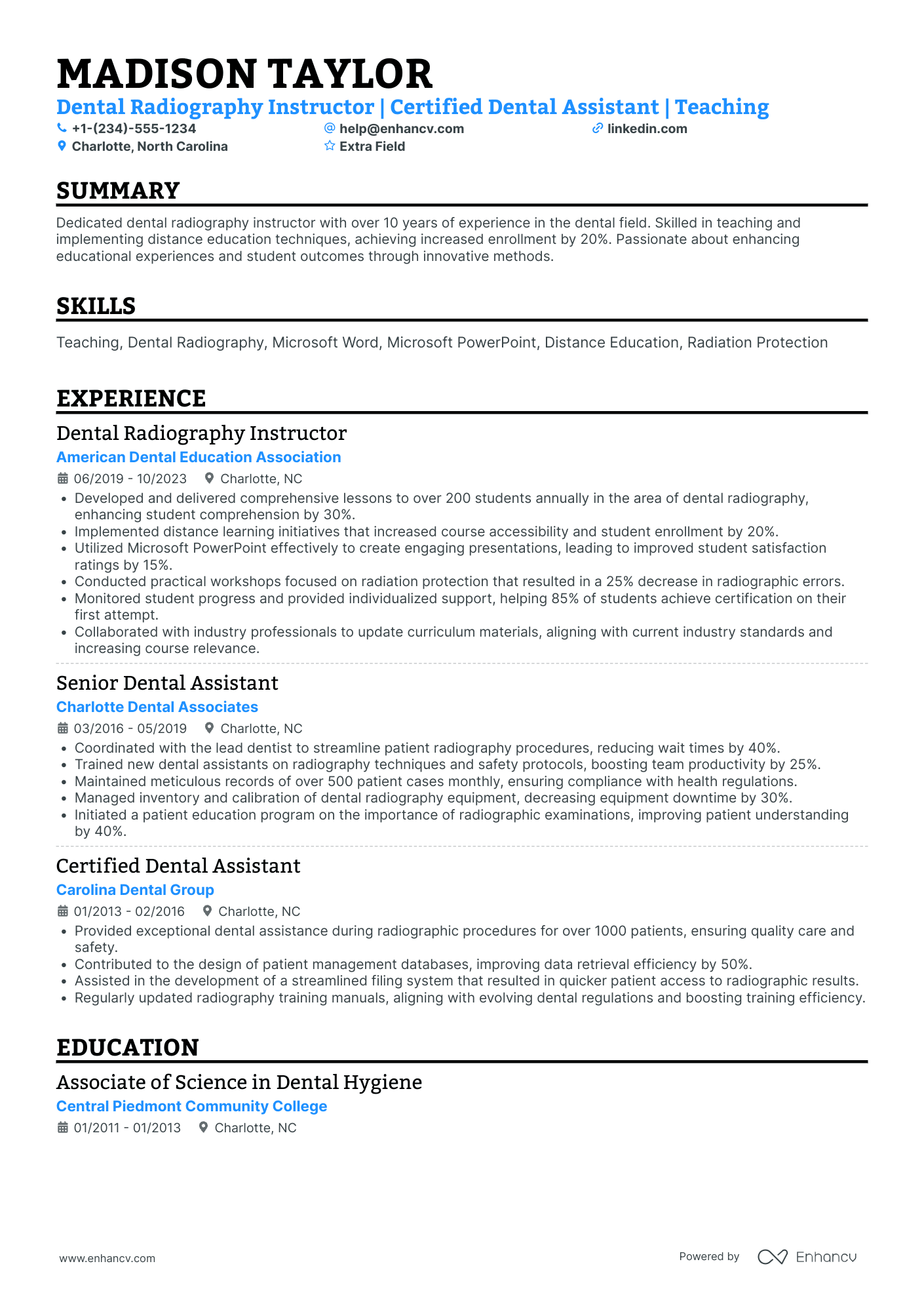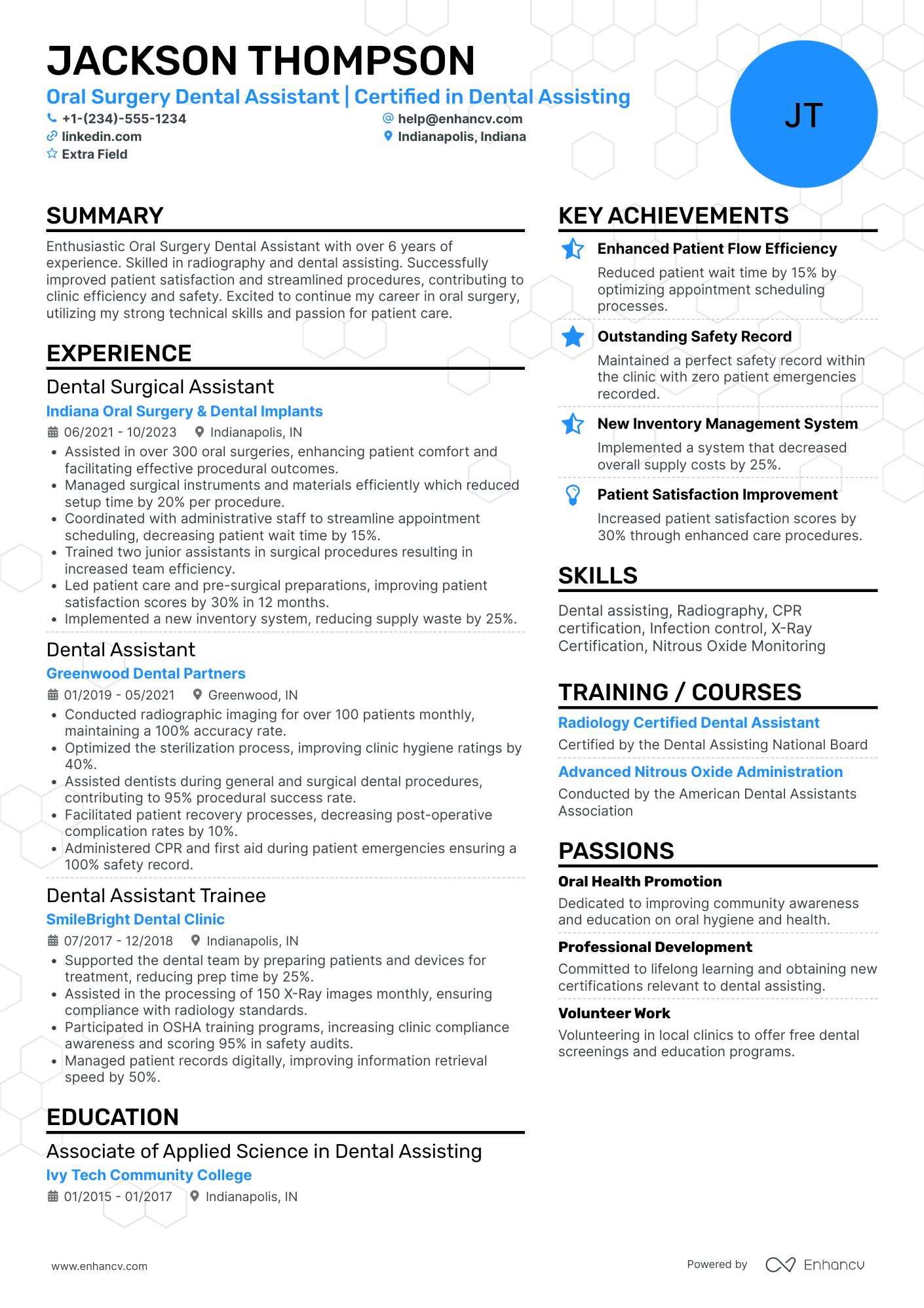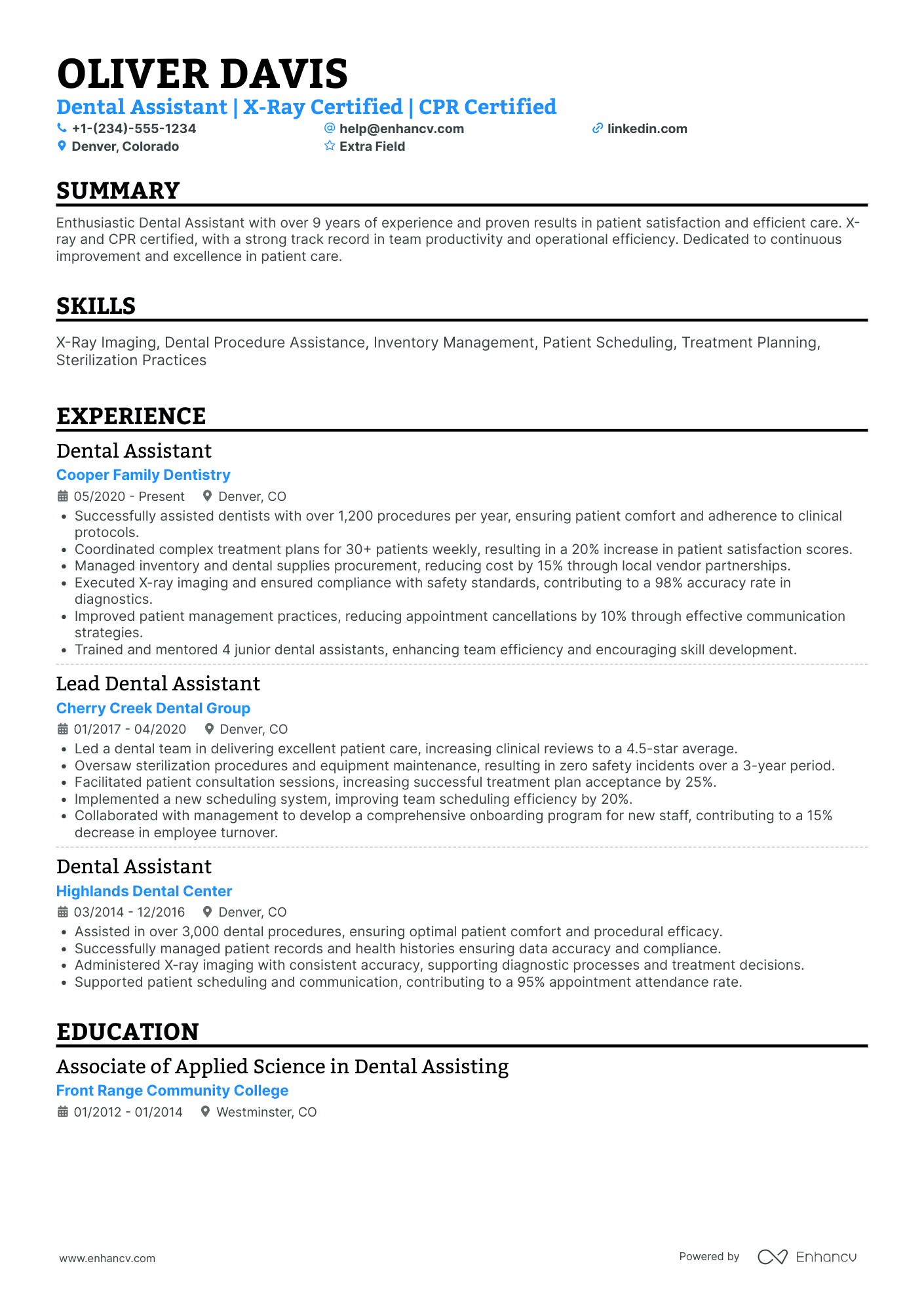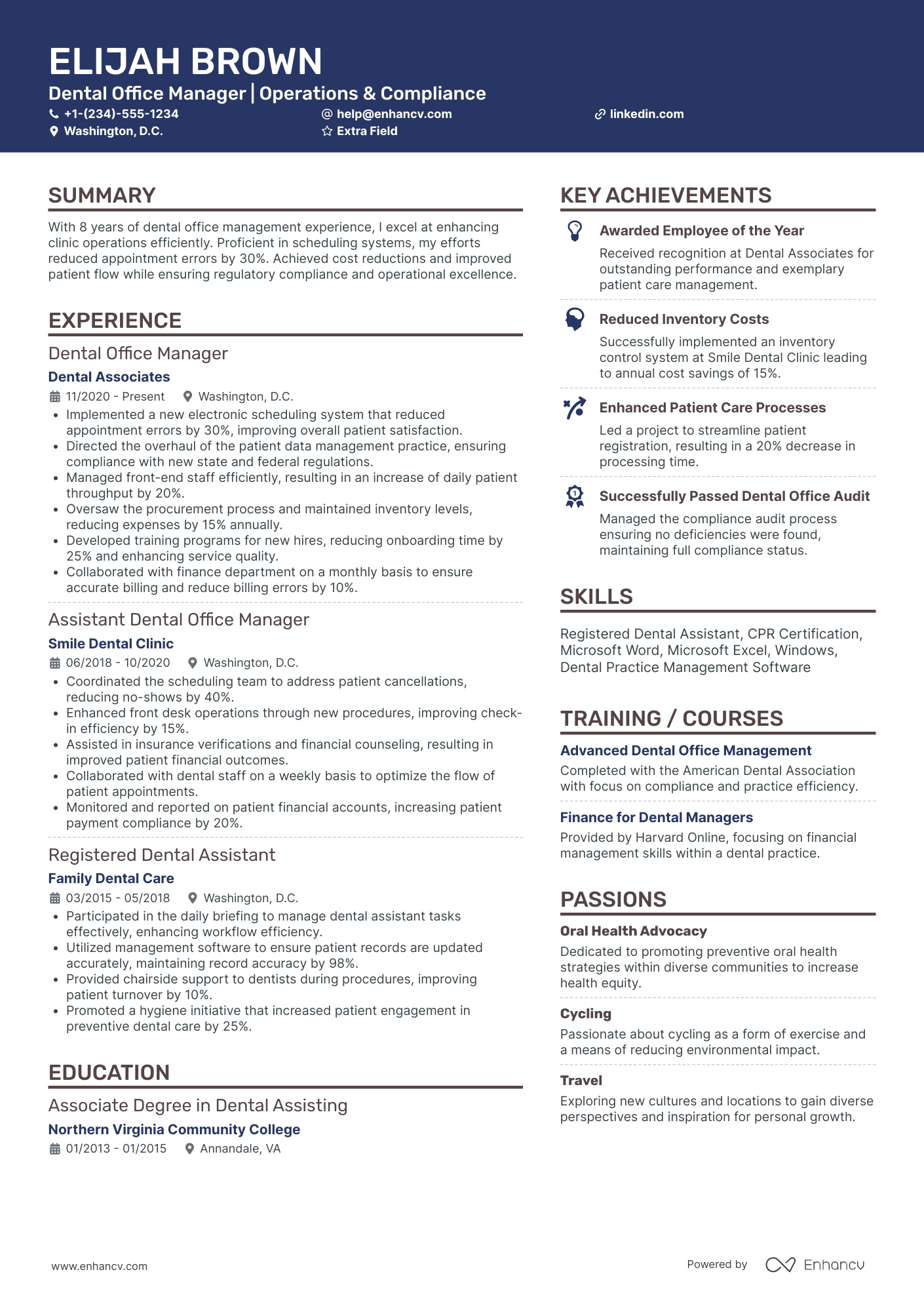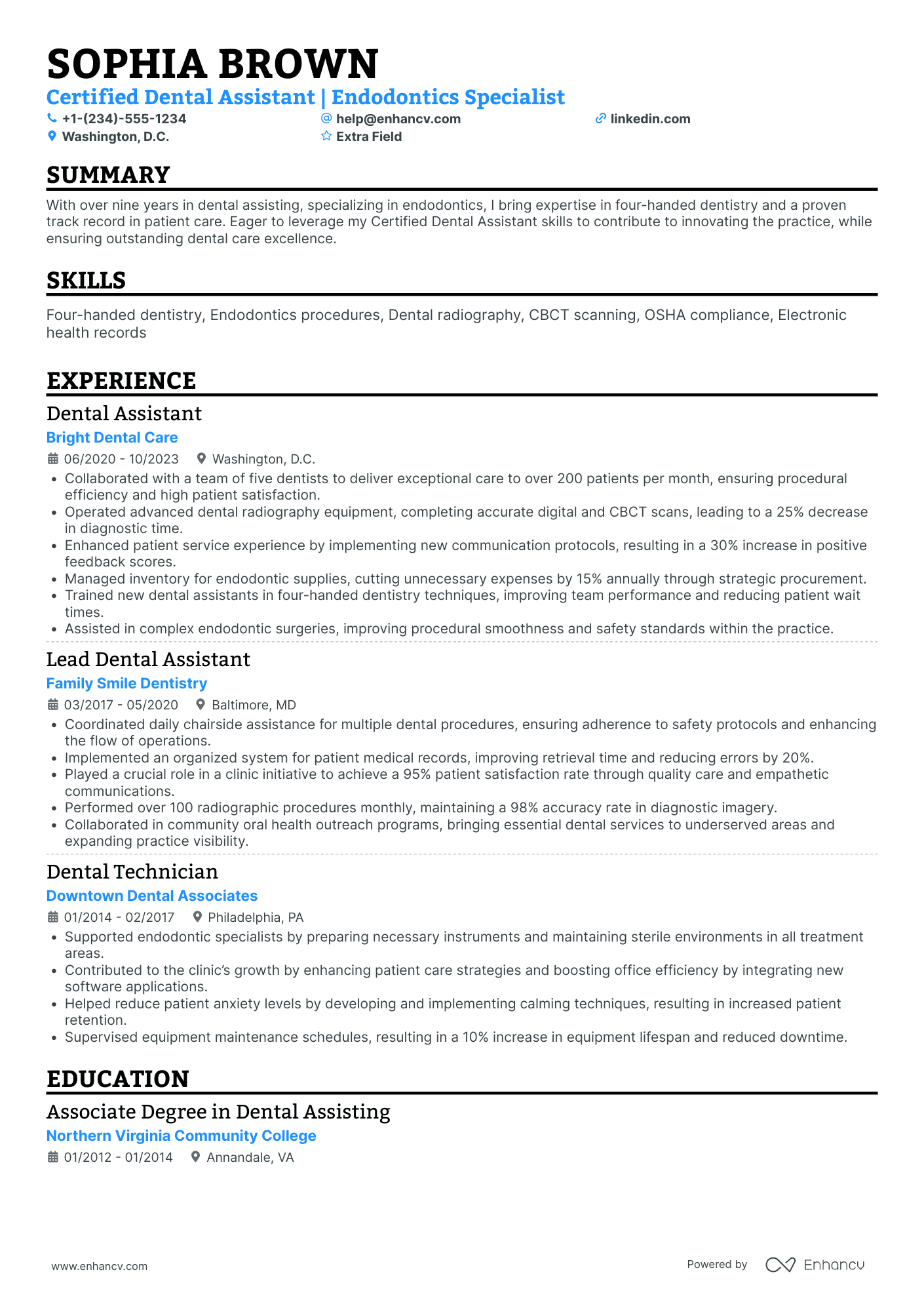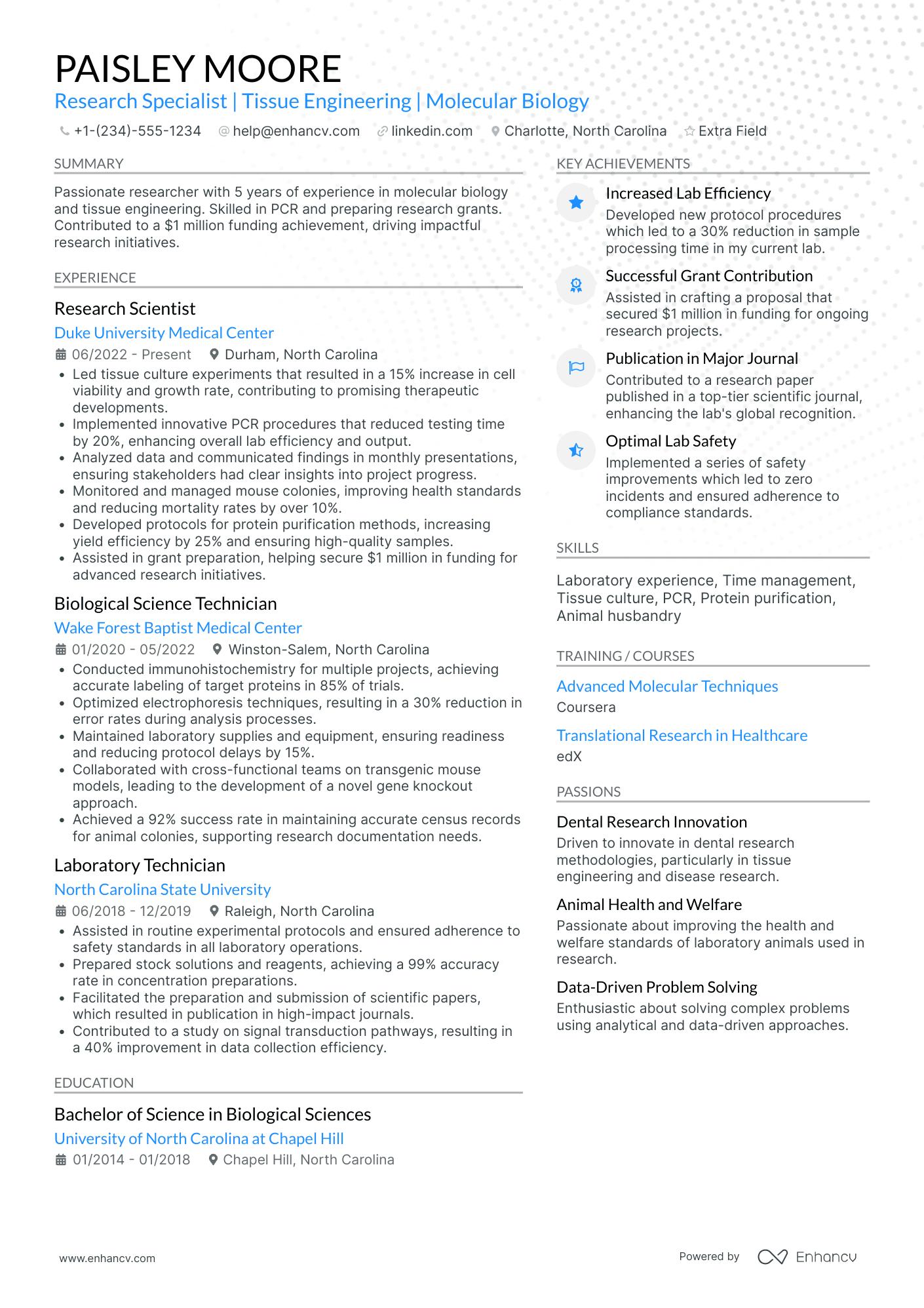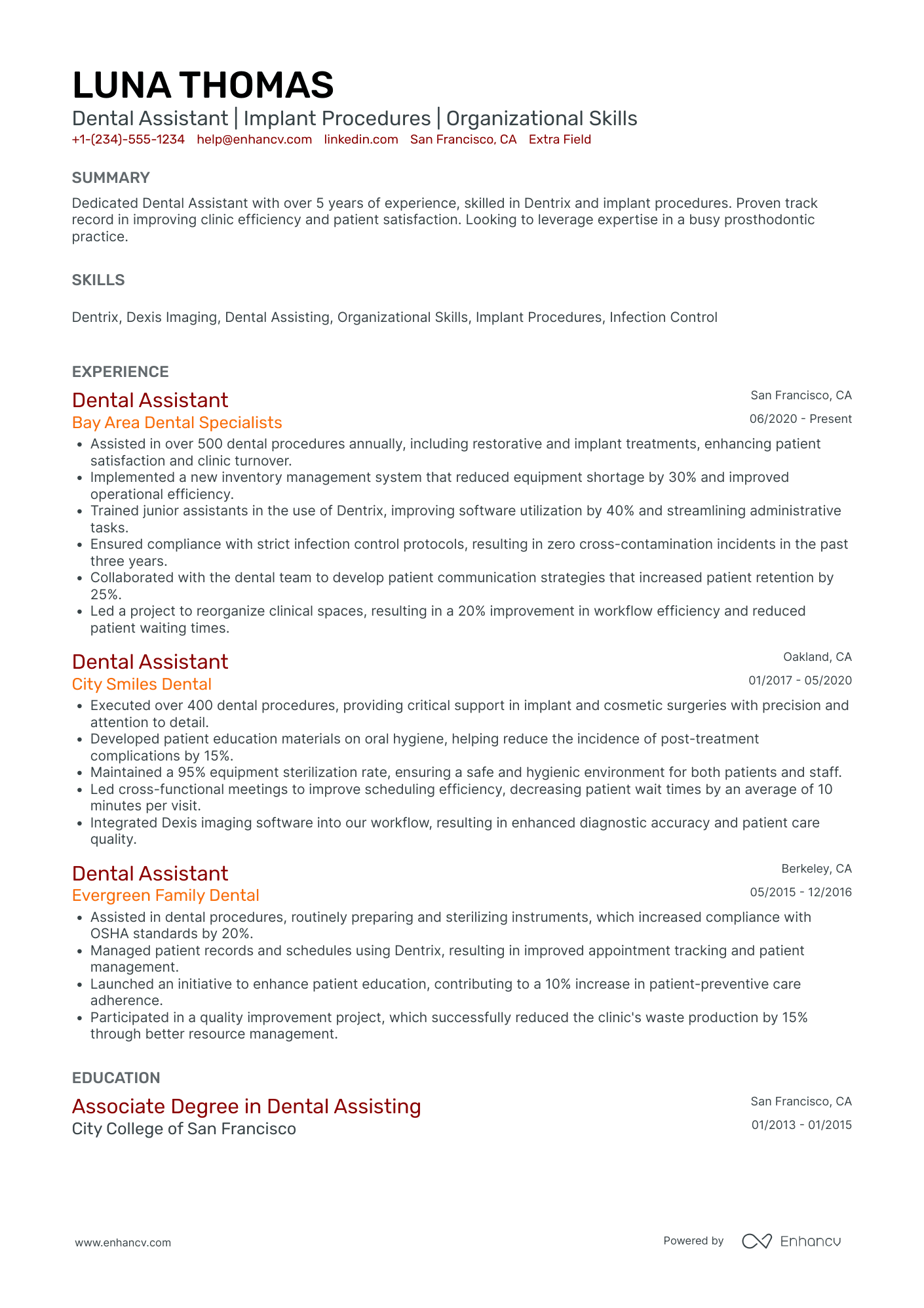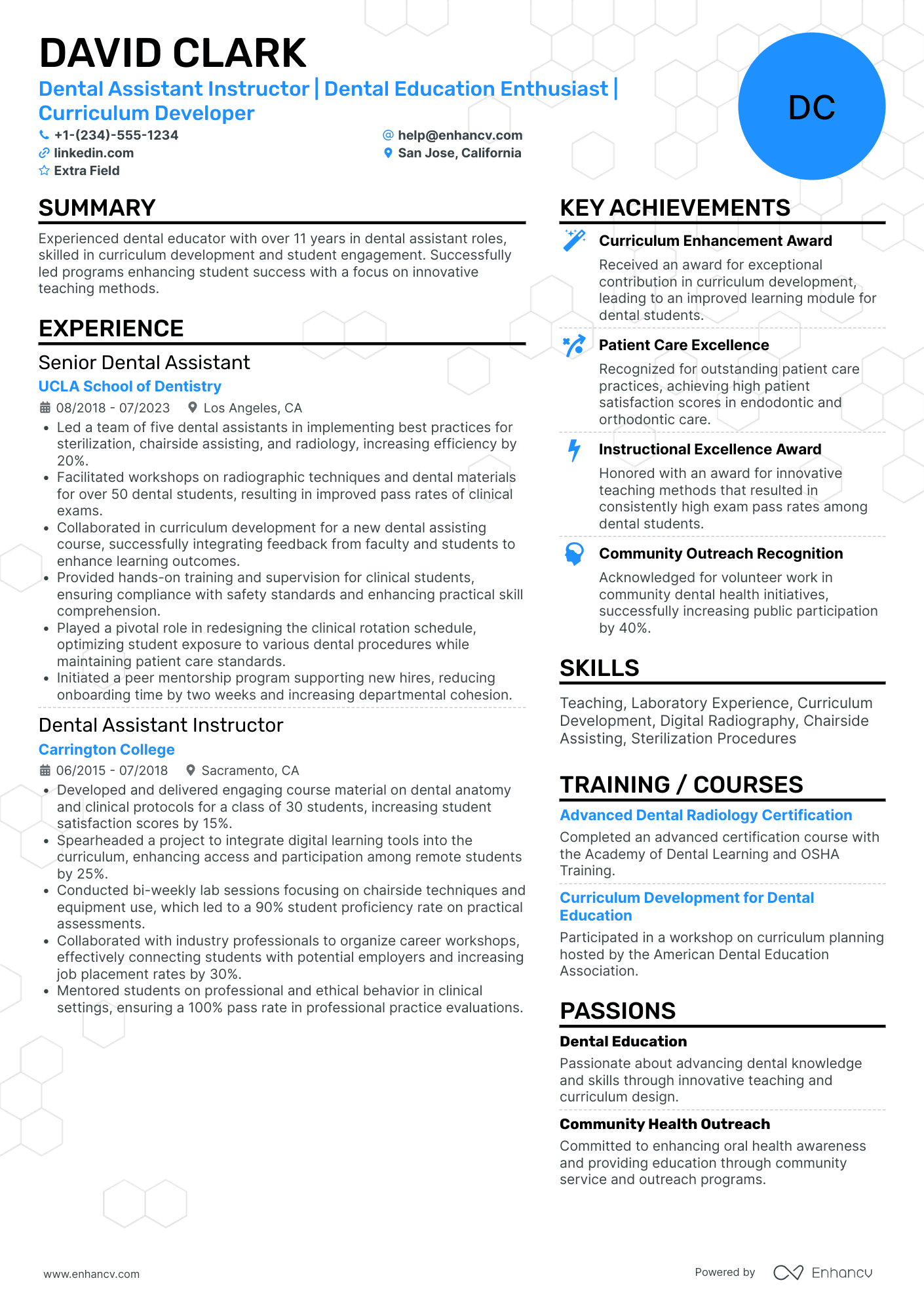Like chameleons, dental assistants adapt to their environment, fitting in wherever needed. Scheduling appointments, greeting patients with a friendly smile, prepping rooms and equipment, assisting in procedures, managing office supplies and patient records, dental assistants are the unsung heroes of the dental office.
This guide, with examples and pro-tips, will ensure your numerous skills and qualifications are evident in the limited space available on your dental assistant resume. As well as addressing these common resume-writing challenges dental assistants encounter:
- Certification and licensure requirements for dental assistants vary based on location and employer, making it difficult to determine which to include on your resume.
- As a dental assistant, you may have diverse skill sets, and choosing the most relevant ones for a particular job can be difficult.
- Choosing the most effective keywords for your resume can be tricky since they may vary among dental assistant jobs.
- The high demand for dental assistants means many enter the field without prior experience. We have tips and tricks to help you combat that.
To see additional resumes for related positions, check out these as well:
Dental Assistant resume examples
By Experience
By Role
How to format a dental assistant resume
Your resume’s formatting is an opportunity to demonstrate technical skills in creating well-formatted, easy-to-read documents, an administrative task you may be asked to perform as a dental assistant.
To ensure your resume is well-organized, professional, and memorable, follow these formatting best practices:
- Creative Elements: Include creative elements like colors and decorative patterns to make your resume unique and memorable.
- Header Content: A prominent header featuring your name, desired job title, and contact information lets employers view them at a glance.
- Ordering: List all section examples in reverse chronological order to ensure your most recent and relevant appear first.
Understanding Applicant Tracking Systems (ATS) is critical when formatting your dental assistant resume.
ATS analyzes text on resumes, looking for exact keywords or phrases corresponding to desired skills and qualifications for a specific job. Employers use these systems to quickly sort and prioritize resumes to consider the most qualified candidates.
Here’s what’s considered “best practices” for ATS-optimized formatting on your dental assistant resume:
- Fonts: Select ATS-friendly fonts matching the overall style of your resume. Some ATS-friendly fonts are Calibri, Arial, and Times New Roman. However, by employing these overused fonts, you may miss a chance to make your resume stand out. For interesting, modern font options with great readability, try Rubik, Lato, Montserrat, Raleway, Exo 2, or Volkhov, all available on the Enhancv Resume Builder.
- Document Type: PDF files are standard for resumes to ensure formatting is maintained and ATS can easily identify and analyze text.
- Creative Elements in Text: Avoid using nonessential stylistic features within text. Elements such as emojis for bullets and non-standard date formats can impede ATS’ ability to recognize information in these sections.
- Headings and Subheadings: Ensure resume sections are organized and include simple, precise headings. Standard section titles ensure ATS accurately recognizes and extracts information from these sections.
Be aware of location-based layout differences – Canadian resumes, for instance, might differ in format.
Is your resume good enough?
Drop your resume here or choose a file. PDF & DOCX only. Max 2MB file size.
To improve the organization and ATS optimization of your resume, include the following top-recommended sections:
The top sections on a dental assistant resume:
- Contact Information: This allows prospective employers to know who the resume belongs to and how to get in touch with the candidate.
- Personal Statement: A brief, concise explanation of the candidate's motivation for becoming a dental assistant and the unique skills or experiences they bring.
- Certifications and Licenses: In the field of dental assistance, certain qualifications or licenses can be legally required, proving the candidate's ability to carry out the specific tasks.
- Experience: A short history of the candidate's related work experience to verify their skills.
- Clinical skills: Recruiters prioritize proficiency in clinical tasks central to patient care.
- Administrative skills: These are vital to maintaining patient records and office efficiency.
While applicants may have unique backgrounds and qualifications, be sure to include these highly sought-after qualifications on your dental assistant resume when possible:
What recruiters want to see on your resume:
- Dental assisting certification: Many states require dental assistants to be certified, so this is often a top priority for recruiters to ensure the candidate meets legal requirements.
- Experience with dental software: Knowledge of specific dental software such as Dentrix or Eaglesoft shows an ability to manage patient data and scheduling, which can be critical in dental offices.
- X-Ray certification: In many cases, dental assistants might be required to take x-rays; hence having this certification can make the candidate more attractive to recruiters.
- Basic life support skills: Dental procedures can sometimes lead to medical emergencies, so candidates with life support skills are typically highly valued.
- Chairside manner: Recruiters often prioritize dental assistants who demonstrate good interpersonal skills, as they need to interact with patients, easing their worries and explaining procedures.
How to write your dental assistant resume experience
The daily responsibilities of dental assistants vary depending on their credentials and the size and specialization of the dental office where they work. Therefore, it’s critical to highlight employment experiences requiring equivalent skills to the position you are applying for.
PRO TIP
To quickly and easily create a targeted dental assistant resume for each application, follow these steps:
- Create a resume template including a complete list of your experiences, certifications, education, and skills.
- Make a copy of the template for each new application.
- Review the job description for each new job you apply to, paying close attention to the ideal candidate description.
- In the copy of the template, delete all examples that don't align with the job description.
- Edit remaining examples to ensure they include keywords directly copied from the job description for increased ATS optimization.
The experience section of your dental assistant resume should be more than a list of tasks you performed. It’s an opportunity to share the specialized skills you developed and the achievements you made in those past positions. This reveals not only what you did but how successfully you did it.
Take a look at the following experience examples to better understand how focusing on achievements rather than duties improves an experience description.
- •Worked reception answering phone calls, scheduling appointments, and checking in patients.
- •Assisted the dentist in various procedures.
- •Conducted preliminary patient assessments and recorded medical histories.
- •Updated patient records using electronic health records (EHR) systems.
This applicant fails to use active verbs and specific details to document their accomplishments in this role. The description of their duties comes off as generic and doesn’t reflect how well they performed these tasks, which could set them apart from other applicants who performed many of the same tasks.
- •Managed front desk responsibilities, seeing an average of 30 patients daily, including scheduling appointments, answering phone calls, and handling patient inquiries with professionalism and courtesy.
- •Created education flyers to distribute to patients on topics including post-treatment care, oral hygiene practices, and preventive measures, contributing to improved patient satisfaction and compliance.
- •Collaborated with the dental team to implement infection control protocols, maintaining a safe and hygienic working environment.
- •Successfully completed 8 bi-annual professional development sessions to stay current with industry trends, technologies, and best practices.
This applicant does an excellent job using active verbs to indicate they not only performed their assigned duties but actively contributed by managing, creating, collaborating on, and completing them. It’s evident from this description that the applicant was successful and gained valuable experience in this job.
Additionally, they do a nice job including examples and keywords to describe their skills and qualifications for ATS optimization.
How to quantify impact on your resume
An excellent way to stand out amongst other applicants and boost your resume impact is to include quantifiable evidence of your skills and abilities in your experience descriptions. These are tangible, measurable, or verifiable details that highlight your accomplishments in past jobs.
The example above provides an excellent example of incorporating quantifiable evidence:
“Successfully completed 8 bi-annual professional development sessions to stay current with industry trends, technologies, and best practices.”
This applicant stated the number of professional development sessions completed to clarify their dedication to continued learning and staying current in the industry.
In addition to sharing the number of completed training sessions, workshops, or certifications, there are many other ways to quantify your impact. Here are a few additional options for using numbers and data to quantify your skills in your experience descriptions:
- Share a percentage increase in efficiency or patient satisfaction to illustrate the effectiveness of your efforts.
- State the number of patients assisted daily to demonstrate efficiency and capacity to manage a fast-paced environment and large workload.
- Note how many dental procedures you are proficient in to highlight your diverse skill set.
- Identify the size of office staff you've worked with to indicate your experience collaborating as a team member.
- Detail the number of patient records you've managed to showcase your ability to organize and maintain high volumes of patient data.
- Share the amount of office management software or dental equipment you're proficient using to emphasize your technical acumen.
- Mention reductions in wait times or operational costs you contributed to illustrate your efficiency and attention to detail.
When including numbers and statistics, be selective by only mentioning data relevant to the position you're applying for. For example, a small dental practice focused on positive patient experience will be more impressed by how your efforts resulted in an increased percentage of patient satisfaction than how many patients you treated daily in a large, fast-paced dental office.
How do I write a dental assistant resume with no experience
Some employers offer applicants on-the-job training or certification contingent employment, creating opportunities for applicants without prior dental assistant experience.
However, there are additional considerations to keep in mind when writing a dental assistant resume with no experience. A crucial element is ensuring experiences highlight transferable skills, such as employment, temp work, or even medical or dental office volunteering.
Follow these steps to write an experience section highlighting transferable skills without dental assistant experience:
- Compile a list of keywords from the job description.
- Brainstorm previous employment, educational, or volunteer experiences that showcase the same keyword skills and knowledge from the job description.
- To add credibility, include tangible evidence of these skills, such as certifications, achievements, and quantifiable data.
- Avoid including irrelevant work experiences or outdated experiences.
- List experiences in reverse chronological order to ensure your most recent and relevant examples appear first.
PRO TIP
Don’t worry about explaining or giving details about how your transferable skills align with the job you are applying for in your resume. Your dental assistant cover letter is an excellent opportunity to detail further how your background aligns with the open position.
Without dental assistant experience, this section aims to share related jobs and transferable skills, especially those in medical or dental environments. The best way to demonstrate your potential to succeed in the available position is to utilize keywords from the job description in your examples.
How to list your hard skills and soft skills on your resume
The skills section of your dental assistant resume can be intimidating since an extensive list may be necessary to highlight the broad range of skills required of dental assistants.
Include subsections where appropriate to keep your skills lists manageable—for instance, listing hard and soft skills in separate sections. In addition, you can organize hard skills by creating subsections for clinical and administrative skills.
Additionally, you can trim a lengthy skills section by tailoring it to the desired position. The skills an employer values most will depend on many factors, such as the size of the office, patient demographics, number of employees, and dental specialty. Therefore, it's not necessary to include every skill for every application.
Hard skills - in a nutshell
Hard skills are skills necessary to perform a particular job. They typically require study, training, and practice.
In the dental field, hard skills often require certification and reflect technical abilities, like using office software and dental equipment or performing dental procedures.
When brainstorming hard skills to include on your dental assistant resume, consult this list of top sought by employers in the field:
Best clinical hard skills for your dental assistant resume
- Dental X-ray photography
- Dental impression molding
- Sterilization techniques
- Dental instrument preparation
- Dental procedure assisting
- Coronal polishing
- Fluoride application
- Sealant application
- Infection control
- First aid and CPR
- Oral evacuation
- Digital radiography
- Photography
- Dental health education
- Restorative procedures
- Orthodontic procedures
- Periodontal dressings
Best administrative hard skills for your dental assistant resume
- Administrative Skills
- Patient management software
- Dental coding and billing
- Supply inventory management
- HIPAA compliance
- Dental office management
Soft skills - in a nutshell
Soft skills are intrinsic, personal skills demonstrating the kind of employee you'll be. In a dental office, these skills enable you to provide excellent patient care and satisfaction. For example, in the dental field, compassion, empathy, and active listening are valued regardless of the office in which you work.
These are some of the top soft skills employers look for in dental assistant applicants:
Best soft skills for your dental assistant resume
- Communication skills
- Interpersonal skills
- Patience
- Empathy
- Attention to detail
- Time management
- Stress management
- Teamwork
- Critical thinking
- Problem-solving
- Adaptability
- Listening skills
- Compassion
- Organizational skills
- Professionalism
- Trustworthiness
- Tact and diplomacy
- Customer service skills
- Initiative
- Tolerance
Follow these steps to write your dental assistant skills sections:
- Format your skills section as a simple list without elaboration or examples.
- Differentiate between hard and soft skills by listing them in separate subsections.
- Consider organizing your hard skills further by adding subheadings for clinical skills and administrative skills.
- Target your skills section using keyword skills from the job description.
- Write these keyword skills precisely as they appear in the job description to enhance ATS analysis.
- Never lie about or exaggerate your skills on your resume.
- Ensure consistency between your experience and skills sections by listing the skills mentioned in the experience section in the skills section and vice versa.
In general, employers are willing to offer training in hard skills. However, the intrinsic nature of soft skills makes them difficult to teach. Therefore, it's essential to tailor your resume's hard skills for each application and to include as many keyword soft skills as possible.
How to list your certifications and education on your resume
While certification is not always required, many employers prefer applicants with a general dental assisting certification. Beyond that, there are numerous expanded dental functions certifications (EDFC) available to enable Certified dental assistants (CDAs) to perform specialized tasks such as performing X-rays.
Your resume's education and certifications sections should reinforce your skills sections as evidence supporting your stated skills.
To write your dental assistant certification section and education section, follow these steps:
- Create separate sections titled “Education” and “Certifications” to allow ATS to parse information from your resume accurately.
- List all degrees and certifications in reverse chronological order, putting your most recent and relevant at the top.
Education Specific best practices:
- For each degree, include the name of the university, its’ location, the dates you attended, and the title of your degree.
- Continuing education courses, like those required for a CDA, should be listed in the education section.
- Including your GPA is optional unless the job description specifies a minimum GPA requirement.
- You can include brief statements about relevant exceptional coursework achievements in the example description.
- Only include your major and minor if relevant to the desired position or if it provides relevant information about your background. For example, a minor in Spanish may be appropriate. However, a minor in Dance probably isn’t.
Here’s an example of how an excellent education example:
- •Earned perfect scores in all 10 required courses.
- •Completed a supervised clinical externship, gaining practical experience in assisting with various dental procedures and leading to my first dental assistant employment.
Best practices for listing examples on your resume’s certification section:
- Include the name of the certification, the certifying institution, and the year obtained.
- When appropriate, consider listing certifications under the subheadings “Clinical Certifications” and “Administrative Certifications” for clarity.
- Limit certifications to current, unexpired credentials. For example, if you were certified in CPR four years ago and never renewed, you shouldn't list this since CPR certification is only valid for two years.
- If a certification requires renewal to remain valid, include the date first acquired as well as the most recent renewal date or a "valid through" date. For certifications you have held long-term, this demonstrates soft skills such as organization and responsibility.
- Limit your certifications to only those specifically named or directly related to the required skills mentioned in the job description.
Here’s an example of how a certification item requiring renewal should look on your dental assistant resume:
If you're considering adding a dental assistant certification to your resume, check out one of these highly sought-after by employers.
Best certifications for your dental assistant resume
- Certified dental assistant (CDA) by the Dental Assisting National Board (DANB)
- Registered dental assistant with Expanded Functions (RDAEF) by Various State Dental Boards (specific websites vary by state)
- Certified Oral and Maxillofacial Surgery Assistant (COMSA) by the Dental Assisting National Board (DANB)
- Certified Restorative Functions dental assistant (CRFDA) by the Dental Assisting National Board (DANB)
- Certified Dental Practice Management Administrator (CDPMA) by the Dental Assisting National Board (DANB)
It's essential to be selective when writing your dental assistant resume's education and certifications sections.
Some employers may sift through long lists. However, others will only take a cursory look before determining whether or not your background will suit their needs. Therefore, limiting your qualifications to highlight those that best demonstrate your ability to succeed is critical.
How to write your dental assistant resume summary or objective
A summary or objective section, sometimes called “Resume Profiles” or “Personal Statements,” allows you to briefly contextualize how the data and facts on your resume correspond to your career progression and goals.
These sections demonstrate your suitability for the position, which may not be evident, particularly if you don’t have prior experience as a dental assistant.
Regardless of which personal statement you select, it should clarify how your experiences and qualifications make you a suitable candidate for an available job.
Follow these best practices when writing either a summary or an objective:
- Customize the statement to match the specific job you're applying for, emphasizing relevant skills and experiences.
- Start sentences with action verbs to make your summary dynamic and impactful.
- Be brief. A summary should only be 3-5 sentences.
The difference between a summary and an objective is the focus on either your past experiences or future career goals.
A resume summary focuses on your past work experience and how it aligns with an available job. On the other hand, a resume objective focuses on your future career goals to illustrate how they correspond with the position.
A summary is preferable for dental assistants with extensive experience well aligned to the available job, for example, in the same dental specialty. It highlights how your past success indicates your potential to succeed in that particular role.
To write a summary for your dental assistant resume, follow these best practices:
- Highlight your most relevant skills or experiences that directly overlap with the job description.
- Briefly mention your years of experience to provide context for your level of expertise.
- Write an impactful summary using keywords directly from the job description, highlighting your well-aligned keyword experiences and skills.
- Use details such as naming specific software, dental equipment, procedures, and certifications to reinforce the relevance of your experiences.
- Convey your enthusiasm for the opportunity to continue providing high-quality patient care in the dental field in this position.
Check out how the following summary is improved by including specific details to reinforce skills.
This applicant overlooks several opportunities to include specific details, such as examples of procedures they are proficient in, contributions they’ve made, and their specific certification to incorporate keywords and ensure their qualifications are evident to the employer.
This applicant includes specific examples of tasks they are proficient in, procedures they've performed, and their impact on patient satisfaction. They also named the professional organization where they completed their continuing education. These details lend authority to their stated skills and qualifications and enhance ATS analysis by including keywords from the job description.
An objective section is a better option for dental assistants with limited experience or who are applying for their first job. It allows you to focus on how you plan to use your background to achieve career goals while contributing to the success of the office.
To write your dental assistant resume objective, follow these best practices:
- Describe the type of position you are seeking.
- Share relevant or transferable skills that will help you succeed in the position using keywords directly from the job description.
- Clearly state your career goals and enthusiasm to work towards them in the role.
- Highlight valuable contributions you can make while learning and gaining experience.
- Avoid generic phrases. Instead, focus on specific skills and goals that set you apart.
PRO TIP
Rephrasing specifics from the “Qualifications” or “Ideal Candidate” sections of a job description is a great way to guarantee you mention the skills and qualifications most valued by the employer.
Optimize your resume summary and objective for ATS
Drop your resume here or choose a file.
PDF & DOCX only. Max 2MB file size.
Additional sections for a dental assistant resume
In addition to the top-resume sections, consider including one or more of these optional resume sections to highlight specific qualifications or accomplishments that will help you stand out among the other dental assistant applicants.
- Languages: Excellent patient communication is a cornerstone of patient care. Therefore, being multilingual is a valuable asset in patient-centric environments. Including a language section is an effective way to set yourself apart from other applicants.
- Achievements and Awards: If you’ve received recognition for your work in the past, consider including an awards and achievements section as evidence to support your stated soft skills. In addition to individual awards, you can include awards your office received, such as being voted the top healthcare facility in your community.
- Professional Associations: A professional Associations section highlights your dedication to ongoing improvement and staying current in dentistry. If you’d like to include a professional association membership to your resume, consider joining one of the leading professional associations for dental assistants below.
Professional associations for dental assistants
These prominent professional associations for dental assistants provide resources, support, and opportunities for networking and continuing education:
- American dental assistants Association (ADAA)
- American Association of Dental Office Management (AADOM)
- National dental assistants Association (National Dental Assistants’ Association (NDAA))
- Academy of Chairside Assisting (ACA)
- American Academy of Pediatric Dentistry (AAPD)
Individualizing your resume with tailored sections ensures it reflects all your top qualifications and stands out among other applicants. Should you include sections other than those above, be sure they use catchy, ATS-friendly headings.
How to write a specialization section
If you have extensive experience or certifications in a particular dental specialty directly corresponding to an available job, consider including a specialization section to highlight these qualifications.
Your dental assistant specialization section should include the following:
- The title of your dental assistant specialization
- Relevant training or certifications
- Specialty-specific billing and coding experience
- Technical skills related to using software and equipment
- Skills and expertise in performing specialized dental procedures
- Relevant soft skills, for instance, patience and communication, are vital when working with children in a pediatric dental office.
Here’s an example of how your specialization section should appear on your resume:
Only include a specialization section that demonstrates extensive knowledge, skills, and qualifications if applicable to the available dental assistant position. For instance, the example above would be relevant to a family or pediatric dental office. However, it would not likely be relevant enough to include as a separate section for work in a prosthodontic office. In this case, these skills may be mentioned in the other resume sections, such as the experience section, to demonstrate your capacity to learn specialized skills.
Key takeaways
Selecting among the multitude of skills and qualifications required for dental assisting is one of the and most challenging aspects when writing a resume.
To ensure your dental assistant resume accurately reflects your most valuable, unique skills, experiences, and qualifications, review these key takeaways:
- Targeted resumes include only examples relevant to the available position as found in the job description.
- ATS-optimized formatting helps ensure your dental assistant resume reaches employers.
- Provide quantifiable evidence of achievements in previous dental offices to demonstrate your impact in past jobs.
- Include clinical and administrative hard skills as well as transferable soft skills, using precise wording for enhanced ATS optimization.
- List relevant education and certifications demonstrating your dentistry knowledge and qualifications.
- Give context to the information on your resume by including either a summary or an objective section, depending on your experience level in similar dental assistant positions.
- Use additional sections to showcase credentials that don't fit within other resume sections.
- Include a specialization section when your past dental assistant employment is in a similar environment to the available position to highlight your expertise.
